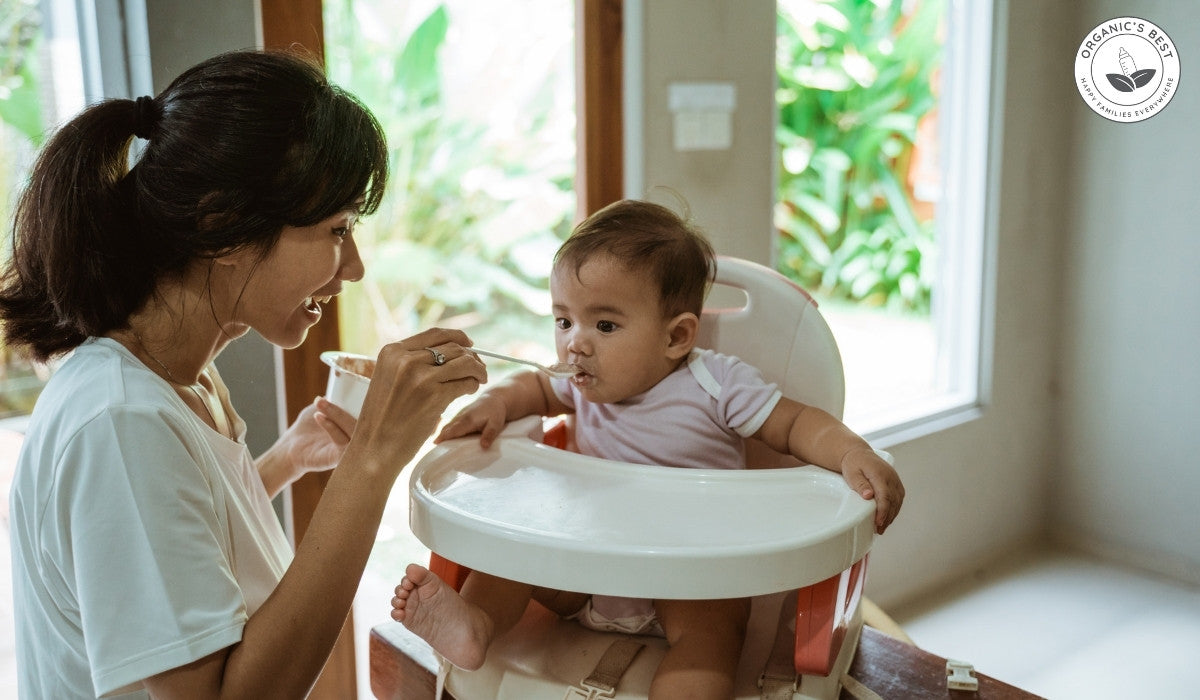Click to Get 2 FREE Boxes/Cans
Click to Get 2 FREE Boxes/Cans
Only New Customers! Click HERE to Get 2 Extra Boxes/Cans for Free With Your First Order.
Only New Customers! Click HERE to Get 2 Extra Boxes/Cans for Free With Your First Order.
BABY FORMULA
Offering new parents top-quality European infant formula from renowned brands like HiPP, Holle, Kendamil, and more. If you’re uncertain about which product to choose, our Formula Finder can help you make the best decision for your baby.
Baby Food
Offering new parents a premium selection of European baby foods, including jars, pouches, cereals, and snacks from esteemed brands like HiPP and Holle.
Exploring Organic Baby Cereal: A Guide to Vegan Cereals For Babies
by Agustina Fernandez September 03, 2024 6 min read

Your baby's first year of life comes with many exciting milestones, one of which is the introduction to solid foods. During this time, choosing the appropriate first few foods can set the foundation for long-term healthy eating habits.
Health-conscious parents aiming to give their tiny tots a strong nutritional start have plenty of organic, vegan baby cereals to choose from.
These plant-based options not only support your baby's growth but also make it easier to avoid common allergens as you introduce solid foods.
Here's everything you need to know about selecting and introducing these cereals.
Table of Contents
What to Look for When Choosing the Right Cereal for Babies
Your baby's first foods should be simple, nutritious, and easy to eat. Since cereal is relatively mushy in texture with a mild flavour and comes in single-grain varieties, this is a great place to start.
When choosing cereal for babies make sure to keep an eye out for the following features, as not all products are made equal, nor are they suitable for all ages.

Easy Digestion: As a solid food for beginners, opt for cereals made from easily digestible grains, like rice or oats. Organic rice cereal for babies is particularly gentle on the stomach, making it an ideal option for first-time eaters.
Ingredients: The best first foods contain minimal ingredients, so look for cereals with preferably just one or two high-quality ingredients.
Baby cereal commonly has a base of oats, millet, spelt, or rice, and as a second ingredient, may be enriched with certain vitamins.
Certified Organic & Vegan: Organic certification guarantees the cereal is free from harmful pesticides, synthetic fertilizers, and GMOs while being vegan ensures that it is made without any animal-derived ingredients, offering a pure, plant-based nutritional profile.
EU Organic certified products must have at least 95% organic ingredients, with the rest typically being essential vitamins and minerals that comply with strict EU standards. Organic farming also prioritizes sustainability and animal welfare, making it a popular choice for eco-conscious parents.
Flavour: Sticking to mild flavour profiles can help your little one adapt to solid foods, so look for products without any added artificial flavours or sweeteners. Once your baby is accustomed to the simple cereals, there are many healthy options with added fruits.
Easy Preparation: For parents on the go, look for products that require little preparation. This will usually mean that you just have to add warm water, breast milk, or formula, and you're good to go! Instant mixes that dissolve smoothly ensure a consistent texture without lumps.
Nutrition Facts: It's a great practice to start checking the nutrition facts on your product labels to get an idea of what is going into your child's body. Many cereals are enriched with nutrients that support growth and energy at certain stages of development, like iron, folate, thiamine (vitamin B1), calcium, or zinc.
Iron, in particular, is crucial as your baby's natural iron stores begin to deplete around six months of age.
Potential Allergens: Many organic baby cereals are free from common allergens like milk, soy, and gluten, but it's important to read labels, especially if your baby has known sensitivities. While vegan cereals are often allergen-friendly, guidelines advise early introduction of common allergens to reduce the risk of allergies, depending on the infant’s risk factors and the healthcare provider’s advice.
Furthermore, opting for cereals with single grains helps to monitor for any potential allergens at the beginning of your weaning journey.
Tips for a Smooth Transition: Introducing Organic Cereal to Your Little One
Now that you know how to choose a suitable cereal, let's discuss how to introduce it to a baby's diet.
One of the most important factors when starting solids is ensuring that your baby is ready for them.

Most experts recommend starting solids around six months, but look for signs of readiness, such as sitting up with minimal support, being able to pick up food by themselves and showing an increased interest in your food.
Your baby's first foods should be very easy to eat- so, ensure that your cereal for baby is a smooth, thin consistency by mixing it with warm water, breast milk, or formula. Gradually thickening the cereal as the baby's oral motor skills advance can help parents tailor texture.
Your baby may find the cereal to be more palatable if it served warm, since they are likely used to this temperature. Just make sure it isn't too hot!
Important Nutrients & Benefits of Organic Infant Cereal
Whether you are choosing a rice or oatmeal cereal for babies or any other yummy variety, most cereals from reputable and high-quality brands, like HiPP baby food or Holle baby food, will contain many of the same nutrients, such as:
Iron: Supports brain development and the formation of hemoglobin, which carries oxygen in the blood.
Folate: Vital for healthy cell division and growth, particularly important during rapid development phases.
Calcium: Supports the development of strong bones and teeth, which are growing rapidly in infancy.
Zinc: Plays a crucial role in immune function and overall growth, helping your baby's body develop properly.
Dietary Fiber: Found in whole grains like oats, dietary fiber supports healthy digestion and bowel function, helping prevent constipation and promoting regularity.
Thiamine: Crucial for healthy neurological function and energy metabolism. Babies are at a greater risk of deficiencies in this vitamin as it may be lacking in sufficient quantities from their diet. So, under European law, many cereals are fortified to help prevent a deficiency and associated health issues.
Popular Organic Vegan Cereal Options for Babies
Some of the top-rated baby cereals on the market come from trusted baby food brands, HiPP and Holle. They offer a wide variety of infant cereals perfect for little ones starting at 5 months.
Many Holle and HiPP baby cereal is dairy-free, offering gentle, easily digestible meals that meet vegan dietary preferences.
Here are some of our favourites...

Organic Baby Rice Cereal
- Holle Organic Rice Porridge (5+ Months) - 250g
- HiPP Organic Grain Porridge - Fine Millet With Rice And Corn (5+ Months) - 200g
Organic Baby Oatmeal Cereal
- HiPP Organic Cereal Oats Porridge - 100% Oats (5+ Months) - 200g
- Holle Organic Oats Porridge (5+ Months) - 250g
- HiPP Organic Porridge - Oat Strawberry-Raspberry (8+ Months) - 250g
Answering Your Questions About Baby Cereals
Here are some common questions parents have on the topic of baby porridge.
Is Vegan Cereal Healthy for Babies?
Vegan cereals can be a fantastic food option when starting your baby on solid foods, and are a great source of nourishment throughout infancy and toddlerhood, since they provide dietary fibre, while being free from common allergens and fortified with important nutrients. Remember to always read labels carefully and introduce new grains gradually to monitor for any reactions, even if allergens are uncommon in these cereals.
When Can Babies Eat Cereal?
It depends on the child, but most babies are ready for solids at around six months. Be on the lookout for signs of readiness, and make sure to consult your pediatrician before making any changes to your baby's diet!
What is the Best Baby Cereal to Start with?
Single-grain infant cereal, like rice or oatmeal are often recommended as some of the best organic baby cereal due to their mild flavors, smooth textures, and low risk of causing allergic reactions. Moreover offering thin, soupy consistencies to start can help babies transition from a liquid diet (breast milk or formula) to solids more smoothly.
Is Organic Rice Cereal Safe for Babies?
Yes, this variety of cereal is safe for babies when introduced at the appropriate age and in moderation, serving as a gentle and nutritious way to begin their journey with solid foods.
|
Disclaimer:
Please be aware that this information is based on general trends in babies, and it is not medical advice. Your doctor should be your first source of information and advice when considering any changes to your child’s formula and when choosing your child’s formula. Always consult your pediatrician before making any decisions about your child’s diet or if you notice any changes in your child. Breastfeeding is the best nutrition for your baby because breast milk provides your child with all the essential nutrients they need for growth and development. Please consult your pediatrician if your child requires supplemental feeding. |
Agustina Fernandez
Dr. Agustina Fernandez earned her medical degree from the prestigious Universidad Nacional de Córdoba, Argentina. With a deep-rooted passion for pediatrics, Dr. Fernandez is currently on the path to specializing in children's healthcare. Recently, she has delved into the vital field of infant nutrition. Her research interests include breastfeeding, infant formula, and baby food in little ones’ formative years. Dr. Fernandez's commitment to this area of study underscores her dedication to ensuring the health and well-being of children from their earliest days.
Leave a comment
Comments will be approved before showing up.
Also in Organic Infant Nutrition and Health Blog

European Baby Formula Stages: What New Parents Need to Know
by Agustina Fernandez February 18, 2026 12 min read
Read More
Infant Feeding Guide for New Dads: Bottle Feeding Tips
by Agustina Fernandez February 10, 2026 10 min read
Read More
Spilled Milk: Feeding Unfiltered with Hayley
by Agustina Fernandez February 04, 2026 4 min read
Read More
Reviewed by Dr. Bardha Qerimi, MD
-

Dr. Bardha Qerimi: Medical Reviewer of Organic's Best Blog
Dr. Bardha Qerimi completed her medical studies at the University of Prishtina in Kosovo, where she began her journey into the field of medicine. She has since developed a career in medical research, contributing to projects with notable organizations, including the World Health Organization (WHO).
